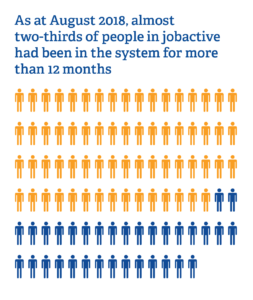In the first in a series of blogs highlighting our key areas of interest for the 2019 Federal Election, Jesuit Social Services’ Media Relations Manager KATHRYN KERNOHAN writes that reform of the jobactive system would support more marginalized Australians into work.
The Federal Government’s jobactive program, the main employment services program for Australian jobseekers receiving income support, has been met with criticism at almost every turn since it began in 2015.
A requirement for participants to apply for a minimum number of jobs a month, high turnover among jobactive staff and the adoption of the PaTH internship program described by the Federal Opposition as “exploitative” and “ineffective” are among the key issues that have plagued the program.
In early 2019, a Senate Committee report found that jobactive “is not fit for purpose… [it is] not delivering on its stated objectives.”
“Many participants are suffering because of the program’s punitive compliance arrangements… providers are overburdened with red tape and consultants are struggling to help participants whilst also policing compliance requirements,” the report reads.
It is clear from the statistics alone that jobactive, with its focus on compliance and meeting narrowly prescribed outcomes, has failed to meet the needs of the most disadvantaged jobseekers.
As at August 2018, almost two-thirds of people in jobactive had been in the system for more than 12 months, and one in five had been in the system for more than five years.
Research suggests that on average, employment services consultants have 148 people on their caseload.
Unless the jobactive system is reformed to ensure that contracts are based on lower caseloads to enable tailored assistance for disadvantaged jobseekers, and that targeted and additional assistance is provided to the same cohort, the system will continue to fail those most in need.
These are two of the key recommendations of our recently published Federal Election platform, A more compassionate Australia.
Jesuit Social Services has worked with many people who face significant barriers to employment, creating a successful pathways to work model based on tailored pre-accredited and accredited training and work skills programs, and effective employment services which meet the needs of both participants and employers.
Many of the people we work with have little experience with stable employment, low levels of basic skills and a range of other barriers to workplace inclusion.
This can range from early school leavers to people who have had contact with the criminal justice system, people who have left school early, or have mental health issues, or who have experienced substance abuse problems, and people from culturally and linguistically diverse backgrounds.
All people deserve the chance to develop real skills for life, learning and work but we know that jobactive’s current ‘one size fits all’ approach is focused on securing short-term employment outcomes and not long-term change.
In our submission to the Senate Education and Employment Reference Committee’s inquiry into jobactive, we noted that the Commonwealth employment services system must be reformed to enable time and resources to be invested in those who are most in need of support.
The best way to help people find work is to help them gain the essential vocational and personal skills they need, and to create strong relationships with employers to open up employment opportunities which support and build their work skills and confidence.
We point to the Jobs Victoria Employment Network (JVEN), as an example of a program that works. This employment services initiative contracts organisations such as Jesuit Social Services to specifically support people with significant barriers to employment, and enables its JVEN providers to invest the time and resources necessary to support each individual. It prepares people for work and links them in with suitable job opportunities.
Our Federal Election platform also calls for additional post-placement support and mentoring for disadvantaged people, and for jobactive providers to produce comprehensive and independent assessments to ensure people are provided with the most effective support.





